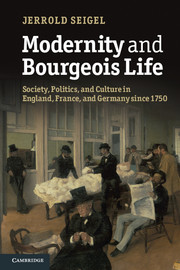 Modernity and Bourgeois Life
Modernity and Bourgeois Life Book contents
- Frontmatter
- Contents
- Illustrations
- Preface
- 1 Introduction: ends and means
- Part I Contours of modernity
- 3 Monarchical centralization, privilege, and conflict: France
- 4 Localism, state-building, and bürgerliche Gesellschaft: Germany
- 5 Modern industry, class, and party politics in nineteenth-century England
- 6 France and bourgeois France: from teleocracy to autonomy
- 7 One special path: modern industry, politics, and bourgeois life in Germany
- Part II Calculations and lifeworlds
- 9 Men and women
- 10 Bourgeois morals: from Victorianism to modern sexuality
- 11 Jews as bourgeois and network people
- Part III A culture of means
- 13 Bourgeois and others
- 14 Bourgeois life and the avant-garde
- 15 Conclusion
- Notes
- Index
5 - Modern industry, class, and party politics in nineteenth-century England
Published online by Cambridge University Press: 05 June 2012
- Frontmatter
- Contents
- Illustrations
- Preface
- 1 Introduction: ends and means
- Part I Contours of modernity
- 3 Monarchical centralization, privilege, and conflict: France
- 4 Localism, state-building, and bürgerliche Gesellschaft: Germany
- 5 Modern industry, class, and party politics in nineteenth-century England
- 6 France and bourgeois France: from teleocracy to autonomy
- 7 One special path: modern industry, politics, and bourgeois life in Germany
- Part II Calculations and lifeworlds
- 9 Men and women
- 10 Bourgeois morals: from Victorianism to modern sexuality
- 11 Jews as bourgeois and network people
- Part III A culture of means
- 13 Bourgeois and others
- 14 Bourgeois life and the avant-garde
- 15 Conclusion
- Notes
- Index
Summary
By the last decades of the nineteenth century the three countries on which we are focusing, England, France, and Germany, all possessed more tightly integrated national spaces, linking together regions and their components – towns, cities, countrysides, people, resources – through networks structured in remarkably similar ways. Everywhere railroads and telegraphs were creating conditions for the rapid spread of modern industry, and a new species of nationally organized parties gave a changed character to politics. Sharing common institutions and frames of action (in culture too, as will be seen later on), all three places seemed in many ways to be traversing a shared path to modernity. Yet the diverse earlier patterns of development generated by the differing configuration of networks we have sought to describe still made themselves felt, giving a distinct quality to life in each place, and in particular to the relations between bourgeois or middle-class people and those with other social identities. In this and the next two chapters we consider the particular path each country followed as it achieved this tighter mode of integration, the distinct kinds of industrial modernity and party politics each evolved, and the forms and limits of bourgeois power that ensued.
Industrial growth and the limits of precocious integration
The two-sided story in which England appears at once as the pioneer industrial nation and the model for others from late in the eighteenth century, and as following a rhythm more like that of France and Germany than has often been recognized, achieving a modern industrial economy only from around 1870, is well exemplified in the crucial topic of railroad building. Railroads were a key element of modern industry because of their importance first as a means for improving the speed and reducing the cost of transport for both people and goods, and second as a powerful stimulus to metal production and manufacturing more generally. Britain embarked on building railroads markedly earlier than any other country, and by 1850 the United Kingdom had almost 10,000 kilometers of track, nearly twice the German number and three times that of France at the same date – especially remarkable given her smaller size.
- Type
- Chapter
- Information
- Modernity and Bourgeois LifeSociety, Politics, and Culture in England, France and Germany since 1750, pp. 150 - 184Publisher: Cambridge University PressPrint publication year: 2012


